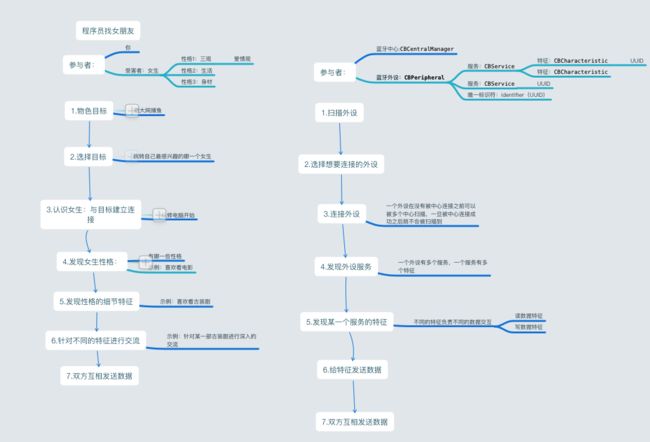第一步:扫描外设
[self.centralManager scanForPeripheralsWithServices:nil options:nil];
第二步:选择想要连接的外设,这里实现通过把扫描到的外设数据回调给tableView,通过点击cell实现
2.1.主控制器里点击按钮后获取扫描的外设数据:
- (IBAction)scanButtonClick:(id)sender {
[kHMBlueToothManager beginScanCBPeripheral:^(NSArray *peripheralArr) {
self.tableArr = peripheralArr;
[self.tableView reloadData];
}];
}
2.2.主控制器里通过tableCell展示数据
- (NSInteger)tableView:(UITableView *)tableView numberOfRowsInSection:(NSInteger)section
{
return self.tableArr.count;
}
- (UITableViewCell *)tableView:(UITableView *)tableView cellForRowAtIndexPath:(NSIndexPath *)indexPath
{
UITableViewCell *cell = [tableView dequeueReusableCellWithIdentifier:@"cell"];
CBPeripheral *peripheral = self.tableArr[indexPath.row];
cell.textLabel.text = peripheral.name ;
cell.detailTextLabel.text = [peripheral.identifier UUIDString];
return cell;
}
2.3点击cell的代理方法实现选择想要连接的外设
- (void)tableView:(UITableView *)tableView didSelectRowAtIndexPath:(NSIndexPath *)indexPath
{
CBPeripheral *peripheral = self.tableArr[indexPath.row];
[kHMBlueToothManager connectPeripheral:peripheral Completion:^(NSError *error) {
if (error == nil) {
NSLog(@"连接成功");
}else{
NSLog(@"连接失败");
}
}];
}
第三步:连接外设
#pragma mark -流程3-连接外设
- (void)connectPeripheral:(CBPeripheral *)peripheral Completion:(void(^)(NSError *))completionBlock
{
[self.centralManager connectPeripheral:peripheral options:nil];
//保存连接回调
self.connectBlock = completionBlock;
}
第四步:发现外设服务
#pragma mark -流程4 开发发现外设的服务
//如果没有寻找服务的话,外设的服务数组是空
//3.寻找外设的服务,为nil则表示寻找所有的服务
[peripheral discoverServices:nil];
第五步:通过代理方法发现服务里的特征
#pragma mark -流程5 发现外设的服务
- (void)peripheral:(CBPeripheral *)peripheral didDiscoverServices:(NSError *)error
{
//遍历外设的服务
for (CBService *service in peripheral.services) {
//实际工作中,智能硬件开发,硬件工程师会给你一份蓝牙协议,协议中会表名哪一个功能对应哪一个服务
NSLog(@"服务UUID:%@",service.UUID);
#pragma mark -流程6 发现服务的特征
//开始寻找服务的特征 第一个参数:特征UUID 为nil表示寻找所有特征 第二个参数:服务
[peripheral discoverCharacteristics:nil forService:service];
}
}
第五步:也是通过代理方法发现服务的特征
#pragma mark -流程6 发现服务的特征
- (void)peripheral:(CBPeripheral *)peripheral didDiscoverCharacteristicsForService:(CBService *)service error:(nullable NSError *)error
{
for (CBService *service in peripheral.services) {
//遍历服务的特征
for (CBCharacteristic *characteristic in service.characteristics) {
//特征是中心与外设进行数据交互最小的单位 所有的数据的发送都是发送给特征的 每一个特征都对应一个非常细节的功能:
NSLog(@"特征UUID:%@",characteristic.UUID);
//开启与特征之间的通知(中心与外设长连接,当特征发送数据过来时,能够及时收到)
[peripheral setNotifyValue:YES forCharacteristic:characteristic];
//读取特征服务,一次性
// [peripheral readValueForCharacteristic:c];
//例如我的小米手环1代 其中 2A06这一个特征表示寻找手环功能 如果给该特征发送一个 二进制为2的指令 此时手环会震动
第六步:给特征发送数据(这里根据自己的需求来做)
#pragma mark -7.给特征发送数据(根据实际的特征UUID来做)
if ([[characteristic.UUID UUIDString] isEqualToString:@"2A06"]) {
/**
Value:给特征发送的数据
Characteristic:特征
type:特征的类型 实际开发过程中:特征的类型不能写错 具体的情况我们可以两个都试一下 CBCharacteristicWriteWithResponse 该类型需要回应
CBCharacteristicWriteWithoutResponse,不需要回应
*/
Byte byte[1];
byte[0] = 2 & 0xff;
[peripheral writeValue:[NSData dataWithBytes:byte length:1] forCharacteristic:characteristic type:CBCharacteristicWriteWithoutResponse];
}
}
}
}
第七步:双方互发数据(这里也是根据需求来做)
//给特征发送数据回调
- (void)peripheral:(CBPeripheral *)peripheral didWriteValueForCharacteristic:(CBCharacteristic *)characteristic error:(nullable NSError *)error
{
}
#pragma mark- 获取外设发来的数据,不论是read和notify,获取数据都是从这个方法中读取。
- (void)peripheral:(CBPeripheral *)peripheral didUpdateValueForCharacteristic:(CBCharacteristic *)characteristic error:(NSError *)error
{
NSLog(@"外设发送过来的数据:%@",characteristic.value.description );
}
#pragma mark- 中心读取外设实时数据
- (void)peripheral:(CBPeripheral *)peripheral didUpdateNotificationStateForCharacteristic:(CBCharacteristic *)characteristic error:(NSError *)error {
if (error) {
}
if (characteristic.isNotifying) {
//读取外设数据
[peripheral readValueForCharacteristic:characteristic];
NSLog(@"%@",characteristic.value);
} else {
}
}
